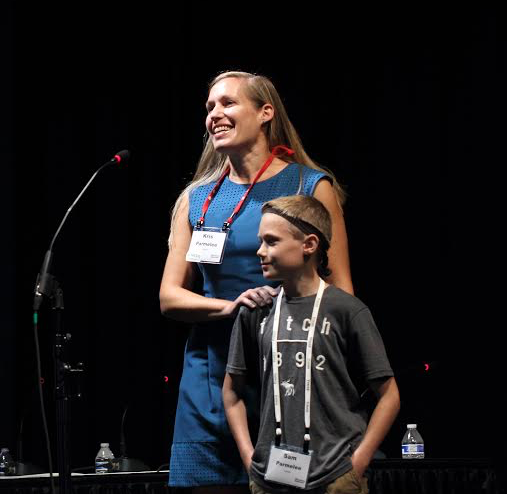Lectio helps people with dyslexia ‘read to learn’
They say that necessity is the mother of all invention. Kris Parmalee — mother of Sam, who has dyslexia — has certainly taken that saying to heart.
Kris was frustrated that there weren’t any easy-to-use tools to help her son read and pronounce that one word on a worksheet or in a passage of text that he couldn’t read himself, and it drove her to find a solution.

Kris Parmaleeinitially created Lectio for her son Sam to use.
It functions as a spot reader for students who have moved on from learning to read, to reading to learn — and for only a one-time purchase of $4.99.
To use Lectio you simply take a photo of the passage you wish to read and the app uses optical character recognition (OCR) technology to transform each individual word into a yellow button that reads the word aloud when selected. This allows a person with dyslexia to hear the words aloud that they may have trouble reading traditionally.
Lectio has a simplified user interface that makes it extremely easy-to-use and intuitive. The app does not require WiFi, which allows users to read wherever, whenever with restriction. It also exclusively utilizes the in app camera, NOT allowing the user to save the picture for future viewing, making it approved for use on tests and other in-class assignments that would otherwise not allow the technology.
Lectio is also as portable as the iPhone, iPad, or iPod its downloaded to, and it’s discreet enough that children with dyslexia do not feel embarrassed by their need to use it.
Parmalee and her co-creator exclusively bootstrapped the start-up without any outside funding.
“When we began the first model of this app (originally called DCODIA), it relied heavily on the Internet to operate and we focused much more on getting investors,” Parmalee said. “We quickly realized that we weren’t making much progress and shifted gears. The second time around we decided to fund it ourselves and focused much more on developing the app and getting it to operate offline for ease of use to the customer.”

Lectio allows independent reading and learning when outside assistance is not easily accessible. Parmalee says, “During homework time there is no more ‘Mom, what’s this word?’ Sam is able to complete his homework on his own without interrupting his siblings while I cook dinner,” which she says is a big bonus for the family.
Sam, the most well-spoken middle schooler I have ever met, says firsthand that Lectio has changed the way he lives with his disability. “The assistive readers I used in the past weighed over ten pounds, hung around my neck, and took forever to use. Talk about a sign on my forehead that says ‘dyslexia’.”
Moving forward, Kris hopes to format Lectio to where it can read a photo that is taken landscape as the current model can only read photos taken portrait. She is also pushing to get Lectio into the resource classrooms of local Indiana schools to further assist those with Dyslexia.
“Lectio is not a fix-all solution or replacement for one-on-one interventions in the classroom or at home. It is simply another tool in the toolbox designed to complement other learning support strategies. This is not a disability that you can take a pill for or cure. This is a lifelong challenge. Lectio will help people throughout the course of their lives.”
Visit mylectio.com for more information.



